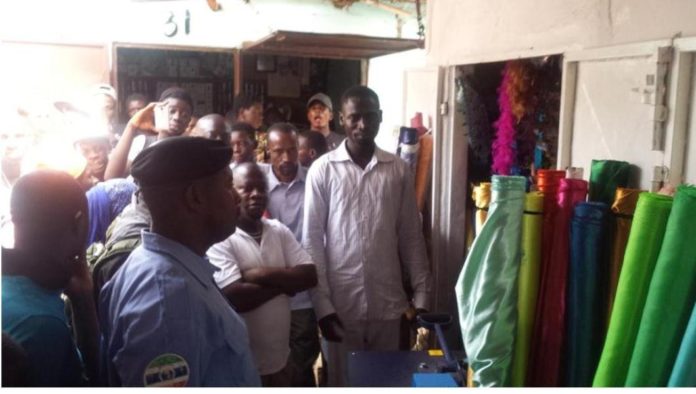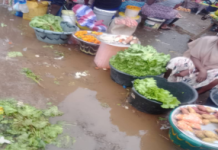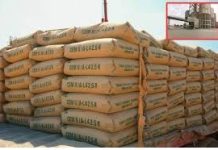By Fatoumatta K Jallow
Shops at Latrikunda market were closed by Gambia Revenue Authority (GRA), the central government revenue collector, due to nonpayment of tax.
This happened on Wednesday 14 June 2017 around 2pm when officials from GRA came to the Market escorted by some police officers to make sure all the shops are closed. It was observed that more than 40 shops were locked, most of which are tailoring shops.
The Chairman of the Market, Mr. Badou Faal said this massive closure of the shops and stalls came about when the Gambia Revenue Authority (GRA) went there asking them to close. He also said the shops and stall owners said that they do not have money to pay the tax due. He added that all shops that are closed are owned by those who have not paid and told GRA that they do not have money to pay.
He explained that shops pay a minimum of six thousand dalasis (D6,000) annually as income tax in addition to the Kanifing Municipal Council (KMC) licence (which is also D6000), rent fee every month amounting to three hundred dalasi (D300) and electricity bills. He decried the amount they have been asked to pay by GRA describing it as too high for them, adding that it is beyond their means. As far as he is concerned even though payment of licences and other fees to the council are high, the services it offers, such as emptying the septic tank and solid waste collection, are visible; unlike the GRA. When it was put to him that the revenue collected by the GRA is used to build schools, hospitals, roads, etc., he argued that every time he goes to the hospital he would have to buy the prescribed drugs from a drug store and that quite often someone would have to massage his broken body because of the bad roads. According to him, the services are very poor compared to the services provided.
He further said KMC also came there on Sunday 11 June 2017 to ask for payment of licence for which the minimum is six thousand dalasi (D6,000) which they consider to be high.
Omar Bah, a tailor said they are suffering under the Jammeh regime but they are hopeful of seeing progress with a change of government. He said every month they spend one thousand six hundred dalasis (D1,600) on electricity in addition to the income tax, value added tax, KMC licences among others which he said is very difficult for them.
He said sometimes they come for work but go home with less than five hundred (D500) a day. He argued that the purpose of a business is to make profit but now any amount of money they earn is been used for payment of taxes and licences causing them to earn less.
Lamin Fadera a tailor said on Monday GRA came to notify them that they will come on Wednesday to collect taxes or close their shops which they did because they didn’t have any money to pay at the moment, because they started sewing not long ago for the koriteh (Muslim) feast and whatever they earn now is what they consume.
He added that they cannot pay Six thousand Dalasis (6,000) at the moment because what they earn in a day is less.
Mr Samba Sallah Deputy Commissioner of Domestic Taxes Department of the GRA said that before a closure notice is given to any person to close his or her business, they always present a demand notice, then a reminder notice and then another notice known as final demand notice before closure notice is issued to any tax defaulter. He explained that they do not just issue a notice of closure like that but will exhaust all means before issuance of such notice. He said the payment is a legal requirement and all business operators should comply with the Act because it will not be fair if others pay whilst others do not pay.
He maintained that they are just tax authorities and do not make any law fixing the tax to be paid. He also said the laws are made to be obeyed and they are there to implement the laws.
He advised all entities that have to pay tax to come forward and pay their dues and avoid the GRA Commissioner to ask them to pay because it is always expensive by then.
He said the taxpayer should not wait for the commissioner general to tell them this is your tax liability because the law says every tax payer should register their businesses and do all the necessary arrangements to come and pay.
He said all the taxes people pay go to central bank, even their staffs are not paid with that money although in the law certain percentage should be given to GRA.





















